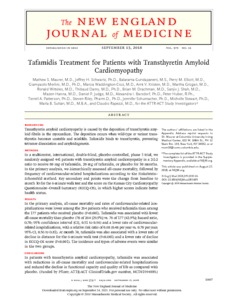Maurer, MS;
Schwartz, JH;
Gundapaneni, B;
Elliott, PM;
Merlini, G;
Waddington-Cruz, M;
Kristen, AV;
Grogan, M;
Witteles, R;
Damy, T;
et al.
Maurer, MS; Schwartz, JH; Gundapaneni, B; Elliott, PM; Merlini, G; Waddington-Cruz, M; Kristen, AV; Grogan, M; Witteles, R; Damy, T; Drachman, BM; Shah, SJ; Hanna, M; Judge, DP; Barsdorf, AI; Huber, P; Patterson, TA; Riley, S; Schumacher, J; Stewart, M; Sultan, MB; Rapezzi, C; ATTR-ACT Study Investigators
(2018)
Tafamidis Treatment for Patients with Transthyretin Amyloid Cardiomyopathy.
N Engl J Med, 379 (11).
pp. 1007-1016.
ISSN 1533-4406
https://doi.org/10.1056/NEJMoa1805689
SGUL Authors: Anderson, Lisa
![[img]](https://openaccess.sgul.ac.uk/113684/1.hassmallThumbnailVersion/nejmoa1805689.pdf)  Preview |
|
PDF
Published Version
Available under License ["licenses_description_publisher" not defined].
Download (450kB)
| Preview
|
Abstract
BACKGROUND: Transthyretin amyloid cardiomyopathy is caused by the deposition of transthyretin amyloid fibrils in the myocardium. The deposition occurs when wild-type or variant transthyretin becomes unstable and misfolds. Tafamidis binds to transthyretin, preventing tetramer dissociation and amyloidogenesis. METHODS: In a multicenter, international, double-blind, placebo-controlled, phase 3 trial, we randomly assigned 441 patients with transthyretin amyloid cardiomyopathy in a 2:1:2 ratio to receive 80 mg of tafamidis, 20 mg of tafamidis, or placebo for 30 months. In the primary analysis, we hierarchically assessed all-cause mortality, followed by frequency of cardiovascular-related hospitalizations according to the Finkelstein-Schoenfeld method. Key secondary end points were the change from baseline to month 30 for the 6-minute walk test and the score on the Kansas City Cardiomyopathy Questionnaire-Overall Summary (KCCQ-OS), in which higher scores indicate better health status. RESULTS: In the primary analysis, all-cause mortality and rates of cardiovascular-related hospitalizations were lower among the 264 patients who received tafamidis than among the 177 patients who received placebo (P<0.001). Tafamidis was associated with lower all-cause mortality than placebo (78 of 264 [29.5%] vs. 76 of 177 [42.9%]; hazard ratio, 0.70; 95% confidence interval [CI], 0.51 to 0.96) and a lower rate of cardiovascular-related hospitalizations, with a relative risk ratio of 0.68 (0.48 per year vs. 0.70 per year; 95% CI, 0.56 to 0.81). At month 30, tafamidis was also associated with a lower rate of decline in distance for the 6-minute walk test (P<0.001) and a lower rate of decline in KCCQ-OS score (P<0.001). The incidence and types of adverse events were similar in the two groups. CONCLUSIONS: In patients with transthyretin amyloid cardiomyopathy, tafamidis was associated with reductions in all-cause mortality and cardiovascular-related hospitalizations and reduced the decline in functional capacity and quality of life as compared with placebo. (Funded by Pfizer; ATTR-ACT ClinicalTrials.gov number, NCT01994889 .).
| Item Type: |
Article
|
| Additional Information: |
From New England Journal of Medicine, Maurer, MS; Schwartz, JH; Gundapaneni, B; Elliott, PM; Merlini, G; Waddington-Cruz, M; Kristen, AV; Grogan, M; Witteles, R; Damy, T; et al., Tafamidis Treatment for Patients with Transthyretin Amyloid Cardiomyopathy, 379, 1007-1016. Copyright © 2018 Massachusetts Medical Society. Reprinted with permission. |
| Keywords: |
Administration, Oral, Aged, Aged, 80 and over, Amyloid Neuropathies, Familial, Benzoxazoles, Cardiomyopathies, Disease Progression, Double-Blind Method, Female, Heart Failure, Hospitalization, Humans, Male, Middle Aged, Prealbumin, Quality of Life, Survival Analysis, Walk Test, ATTR-ACT Study Investigators, Humans, Amyloid Neuropathies, Familial, Cardiomyopathies, Disease Progression, Benzoxazoles, Prealbumin, Hospitalization, Administration, Oral, Survival Analysis, Double-Blind Method, Quality of Life, Aged, Aged, 80 and over, Middle Aged, Female, Male, Heart Failure, Walk Test, 11 Medical and Health Sciences, General & Internal Medicine |
| SGUL Research Institute / Research Centre: |
Academic Structure > Molecular and Clinical Sciences Research Institute (MCS) |
| Journal or Publication Title: |
N Engl J Med |
| ISSN: |
1533-4406 |
| Language: |
eng |
| Publisher License: |
Publisher's own licence |
| PubMed ID: |
30145929 |
| Web of Science ID: |
WOS:000444501600005 |
| Dates: |
| Date |
Event |
| 2018-09-13 |
Published |
|
 |
Go to PubMed abstract |
| URI: |
https://openaccess.sgul.ac.uk/id/eprint/113684 |
| Publisher's version: |
https://doi.org/10.1056/NEJMoa1805689 |
Statistics
Item downloaded times since 27 Sep 2021.
Actions (login required)
 |
Edit Item |



